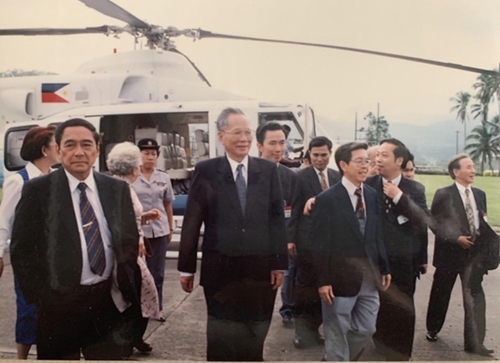1. General, President Le Duc Anh surprised me and made me touched at the first time I accompanied him to a foreign country in 1994. That day, he asked me to join him for a cup of tea and inquired after me about my families, my life, and my job.
In November, 1995, President Le Duc Anh paid a visit to the Republic of the Philippines. While talking with Subic City’s leadership, President Le Duc Anh asked the host to arrange a chair next to him at the banquet table, so that I could have some food while doing my job. Despite my refusal, he insisted on asking me to join the meal with the Vietnamese delegates and local leaders.
    |
 |
|
President, General Le Duc Anh visits Subic City in 1995. Photo provided by Ambassador Pham Sanh Chau |
2. President Le Duc Anh was not only a thoughtful person, but also an experienced general with deep thoughts.
In 1994, under the instructions and directions of President Le Duc Anh, agencies and ministries submitted a document on bestowing the title “Vietnamese Heroic Mother” on women who had made numerous contributions and sacrifices for the national liberation cause to the Party and State for approval. In late August, 1994, the ordinance on honoring Vietnamese women with great contributions was approved by the National Assembly Standing Committee and signed by President Le Duc Anh a month later. I clearly remember the atmosphere of the honoring ceremony, which coincided the 50th founding anniversary of the Vietnam People's Army, at the Presidential Palace. That day, President Le Duc Anh and senior leaders warmly welcomed Vietnamese women who were honored as Vietnamese Heroic Mothers in the first drive.
At a reception for Prime Minister of New Zealand in 1996, President Le Duc Anh shared that Vietnam’s resources for development were limited as the country was not as developed economically as other nations and the Government had to allocate a large budget for social welfare programs, especially for paying gratitude to national contributors and their families and overcoming war consequences. Through high-level exchanges, leaders of foreign countries and President Le Duc Anh conveyed a message to international friends that Vietnam treasured national independence, freedom, peace and would only use weapons when its independence, freedom, territory, and national interests were to be violated. The country always respected and cared about those who had contributed to the nation. I even saw him voicing slowly and in a touching way while mentioning those people. I believed that the State President was expressing his innermost feelings about the nation that suffered from losses due to wars, and had great inspirations for peace.
3. As the State leader in charge of internal and external affairs, President Le Duc Anh actively and creatively realized the Party’s guidelines, especially the Resolution of the 7th National Party Congress (June, 1991) which affirmed Vietnam’s foreign policy of independence, self-reliance, openness, diversification and multilateralization of external relations with the motto: “Vietnam wants to make friends with other nations across the world.” As the State President in the 1992-1997 term, the general made important contributions to the country’s achievements in external affairs, including the normalization of the Vietnam-China and Vietnam-US relations and consolidation of its friendships with neighboring countries and Southeast Asian nations, Vietnam’s participation in the Association of South East Asian Nations, and its preparation to join the World Trade Organization and Asia-Pacific Economic Cooperation Forum. He also contributed to strengthening the country’s relationships with the European Community, the United Nations, and international friends, including Cuba.
During the visit to Cuba in September, 1995, President Le Duc Anh was awarded a “José de San Martín” Order, the noblest order of Cuba. Speaking at the event, he thanked the faithful sentiment of the Cuban people for Vietnam and said that the order was not for him, but for all Vietnamese people. He also expressed his sympathy for the hardships facing the traditional friend and shared Vietnam’s experience in carrying out the Doi moi process and international integration, in developing socialist-oriented market economy, and building socialism. He quoted President Ho Chi Minh’s saying which literally means that consistent with policies and guidelines, but flexible to cope with unexpected changes to affirm that Vietnam was consistent with its policy of building socialism and would take flexible measures to reach the set goals. During the visit, he presented a computer and necessities to the Cuban Government and people, demonstrating Vietnam’s brotherliness and faithful and impartial sentiment for the Cuban people.
4. I first visited President Le Duc Anh’s house on Hoang Dieu street, Ba Dinh, Hanoi in 1997. The French-style house still retained ancient architectural features and was equipped with the old-fashioned furniture of the subsidy period. Looking at the old General in a washed-out military uniform, I comprehended that he had devoted almost all of his life to the military. In the next visits, I learnt his health become worse. His voice was not so clear and I had to ask his wife to be my “interpreter.”
Before undertaking the post of Ambassador to India, in June, 2018, I visited former President Le Duc Anh when he was under treatment at Military Central Hospital 108. As I came in, he woke up. Looking at his eyes, I knew that he was happy to see his former interpreter again. As I held his hand and inquired about his health, he looked at me and expressed his joy through his smiling eyes. The President then turned his head to look at a person who accompanied me. I then introduced to the former President, my former student, Toan Thang.
That was the last time I met General Le Duc Anh. I just want to bow my head to bid the last farewell to the talented General and the charismatic leader who contributed greatly to the glorious revolutionary cause of the Party and nation!
Written by Vietnamese Ambassador to India PHAM SANH CHAU
Translated by Tran Hoai